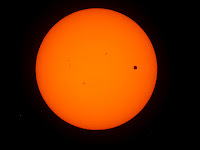Thoughts on a Twice in a Lifetime Event
Tuesday’s Transit of Venus was the last time I will see the beautiful planet cross in front of the face of the Sun. I already miss her.
Sure I’ll be able to see Venus again in only a few short days as she pops out into the pre-dawn skies but she won’t be the same. A Transit of Venus has transformed her. This rarest of astronomical events changes your perspective not only the planets but the history of the universe.
A Transit of Venus only occurs when the planet Venus comes directly between the Earth and Sun. Much more subtle than a solar eclipse, the Transit of Venus is unique because of its precision, its history, and its rarity. The Sun, with Venus as a small beauty mark marching slowly across its behemoth face, has been noted just seven times in human history.
 For the Transits of the 1700s and 1800s, astronomers sailed around the world to catch a glimpse of it. In 2004 I drove my Geo Metro to New Hampshire to see it over the Atlantic Ocean at sunrise. And on Tuesday I flew on a Delta jet to Arizona to witness the event over the stark, high desert. Millions of people watched the various Transit webcasts from around the world. My journeys in 2004 and 2012 and those virtual journeys would have been unthinkable to those viewing the Transit of 1882.
For the Transits of the 1700s and 1800s, astronomers sailed around the world to catch a glimpse of it. In 2004 I drove my Geo Metro to New Hampshire to see it over the Atlantic Ocean at sunrise. And on Tuesday I flew on a Delta jet to Arizona to witness the event over the stark, high desert. Millions of people watched the various Transit webcasts from around the world. My journeys in 2004 and 2012 and those virtual journeys would have been unthinkable to those viewing the Transit of 1882.
After the Transit of 1882, the last one prior to 2004, an editorial ran in the New York Times musing about the future when “the June flowers are blooming in 2004.” It said, “When the last transit season occurred the intellectual world was awakening from the slumber of ages and that wondrous scientific activity which led to our present advanced knowledge was just beginning. What will be the state of science when the next transit season arrives God only knows.”
Our scientific knowledge in astronomy progresses so rapidly that discoveries are made daily. The next Transit of Venus won’t be until the year 2117 and even that one won’t be visible from Cincinnati. Our ancestors will have to travel to Asia, Australia, or Africa to see it. How will they get there? What will life be like 105 years from now? In the 22nd century will space tourists watch Transits of Venus far above the Earth any day they choose?
Even as an astronomer it’s hard to wrap my mind around distances, cycles, and expanses of time that are, well, astronomical. But I am reassured that no matter what may happen on Earth, the Transit of Venus will occur again on December 10, 2117 and December 8, 2125. To those witnessing the next pair of Transits in the 22nd century under the December Sun, in a future I can’t begin to imagine, I wish you clear skies and the same spectacular view that we had twice in the 21st century.
-











